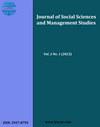A Qualitative Inquiry on the Factors Related to Students’ Disengagement in Leadership Roles
引用次数: 0
Abstract
Leadership is an important skill that students should develop. Campus organizations are some of the avenues for students to hone their leadership skills. However, some students are disengaging in leadership roles in campus organizations. Thus, this study sought to describe the factors behind students’ disengagement in leadership roles in campus organizations using a qualitative-descriptive research approach. The duly-validated written interview questionnaire was administered among six (6) student leaders who were selected through purposeful sampling. Three (3) significant themes such as personal-related, interpersonal-related, and structural-related factors were revealed. From these data, five (5) meaningful categories emerged. As personal-related factors, students disengage in leadership roles in campus organizations as it is a (1) hindrance to their academics and it (2) compromises their health. Furthermore, interpersonal-related factors include having (3) divided time and (4) being in the public eye. Finally, the (5) authority factor is the structural-related factor. Thus, improving the working conditions of student leaders may eliminate the negative experiences that will force them to stop serving their fellow students.学生领导角色脱离相关因素的质性调查
领导能力是学生应该培养的一项重要技能。校园组织是学生磨练领导能力的一些途径。然而,一些学生正在脱离校园组织的领导角色。因此,本研究试图使用定性描述性研究方法来描述学生在校园组织中领导角色脱离的因素。通过有目的的抽样,对六(6)名学生领袖进行了有效的书面访谈问卷调查。揭示了三个重要的主题,即个人相关因素、人际相关因素和结构相关因素。从这些数据中,出现了五(5)个有意义的类别。作为与个人相关的因素,学生不参与校园组织的领导角色,因为这(1)阻碍了他们的学业,(2)损害了他们的健康。此外,与人际关系相关的因素包括(3)时间分配和(4)处于公众视线中。最后,(5)权威因素是结构相关因素。因此,改善学生领导的工作条件可能会消除那些迫使他们停止为同学服务的负面经历。
本文章由计算机程序翻译,如有差异,请以英文原文为准。
求助全文
约1分钟内获得全文
求助全文
来源期刊

Journal of Social Sciences and Management Studies
Social Sciences and Management Studies-
自引率
0.00%
发文量
0
期刊介绍:
Journal of Social Sciences and Management Studies (ISSN: 2957-8795) is a peer reviewed journal focuses on integrating theory, research and practice in the area of management and social sciences. The journal discusses the distinctive disciplinary practices within the sciences of the management and social field and examines examples of these practices. In order to define and exemplify disciplinarity, the journal fosters dialogue ranging from the broad and speculative to the microcosmic and empirical. In considering the varied interdisciplinary, trans-disciplinary or multidisciplinary work across and between the social, natural and applied sciences, the journal showcases interdisciplinary practices in action. The focus of papers ranges from the finely grained and empirical, to wide-ranging multi-disciplinary and transdisciplinary practices, to perspectives on knowledge and method.
 求助内容:
求助内容: 应助结果提醒方式:
应助结果提醒方式:


